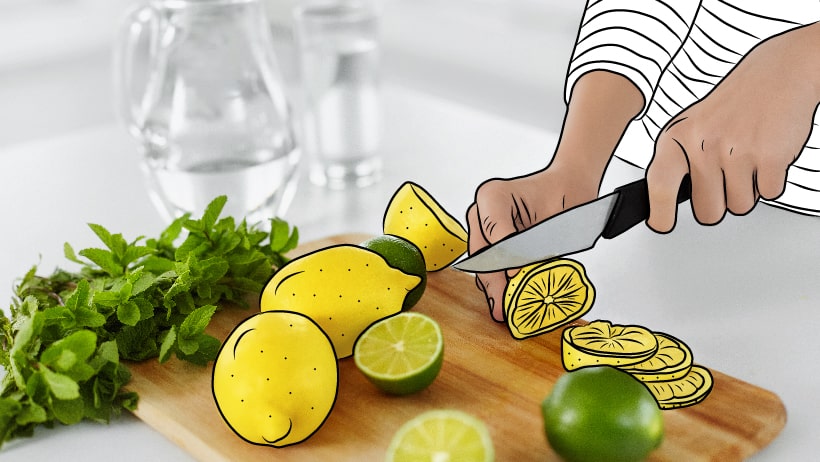
Juice cleanses are continuously growing in popularity. Chances are, even if you haven’t done a juice cleanse, you likely know someone who has. In fact, the cold-pressed juice market in the U.S. is projected to be worth an astounding $8.1 billion by 2024.
So, what’s all the fuss about? There are many reasons people go on juice cleanses, also called juice fasts. Keep reading to understand the benefits of juice cleanses and how to try one for yourself.
Health Benefits of a Juice Cleanse
The USDA recommends that half of your plate be filled with fruits and vegetables at each meal. If you’re not meeting this recommendation, you’re certainly not alone. It can be difficult to eat that much produce. One major benefit of juicing is that it helps you reach the daily recommended amount, often containing multiple servings of fruits and veggies in one glass.
Research shows that there are many benefits to consuming fruit and vegetables in juice form. Studies have found that drinking fresh carrot juice daily has cardiovascular benefits, beetroot juice has antidiabetic properties and provides a significant amount of antioxidants, and orange juice can normalize blood pressure and improve memory.
Detox Benefits of a Juice Cleanse
When done right, juice cleansing also has detox benefits. A cleanse detoxifies your system and lightens the load put on your liver, kidneys, and other organs that filter toxins out of your body. Drinking large amounts of water and pairing a cleanse with exercise can also help with detoxification.
To get the full benefits of a juice cleanse, be sure to avoid the following while cleansing:
- Alcohol
- Caffeine
- Added sugars
- Artificial sweeteners
- Artificial colors
- Artificial flavors
- Unnecessary additives and preservatives
Weight Loss Benefits of a Juice Cleanse
Juice cleansing is a popular way to kick off weight loss efforts. It’s easier to consume fewer calories while cleansing, so many people lose weight while on a juice cleanse. However, it’s important to meet the minimum required calorie amounts during a juice cleanse to ensure you’re speeding up your metabolism rather than slowing it down.
Juice cleanses can also help you manage cravings and change your relationship to food, which is necessary for long-term diet changes. Doing a juice cleanse can help dieting feel easier, since you’ll already be accustomed to restricting the foods you eat after cleansing.
Psychological Benefits of a Juice Cleanse
While many people turn to juice cleansing for the physical benefits, there are also mental and emotional benefits. In fact, fasts have a long history of being used as part of religious and spiritual practices because of the mental clarity they can provide.
While abstaining from solid foods, you’ll likely notice cravings appear. Cleansing can be an opportunity to increase mindfulness and recognize the source of those cravings. Cleansing can help you identify which foods you crave and why, showing how your eating habits relate to your emotions. This is a way to better understand yourself and change your relationship to food for the better.
Many people pair cleansing with reflection. This can take different forms such as journaling, meditating, or engaging in prayer or other religious practices.
How to Try a Juice Cleanse
There are many juice cleanses out there, but not all juice cleanses are created equal! You don’t want to just pick up any juice off the shelf at the grocery store. There are key ways to ensure your juice cleanse is beneficial for your health:
1. Consume low-sugar juices.
One major risk of juicing is overdoing it on the sugar. Not only does high sugar intake affect your blood sugar levels and metabolism, it can also increase your blood pressure. Green juices with more vegetables than fruits are generally lower in sugar than pure fruit juice.
2. Opt for natural, organic, cold-pressed juice.
Juice that has been heated doesn’t have the same level of nutrients and antioxidants so make sure you find cold-pressed juice. Organic juice is also preferable because it’s free from the pesticides used on conventional produce -something you want to avoid if you’re looking to detox.
3. Drink enough calories.
Although juicing is a way to kickstart weight loss, you don’t want to starve yourself. Aim for at least 1,200 calories per day if you’re female and 1,800 per day if you’re male to stay in line with what is recommended by experts.
Although it might be tempting to consume fewer calories in order to lose weight faster, this approach can backfire by slowing down your metabolism. It could also put you at risk for or malnourishment, lightheadedness, and other symptoms.
4. Start slow.
Most popular juice cleanses last anywhere from three to 10 days, but there’s nothing wrong with doing a one-day cleanse to try it out. You could also start slow by replacing one meal per day and gradually lead up to a full cleanse. It’s recommended to cut out animal products, highly processed foods, alcohol, and caffeine in the days leading up to a juice cleanse as well.
Easing into a cleanse will position you for success by preparing you physically and mentally so it doesn’t feel like a major shock to your system.